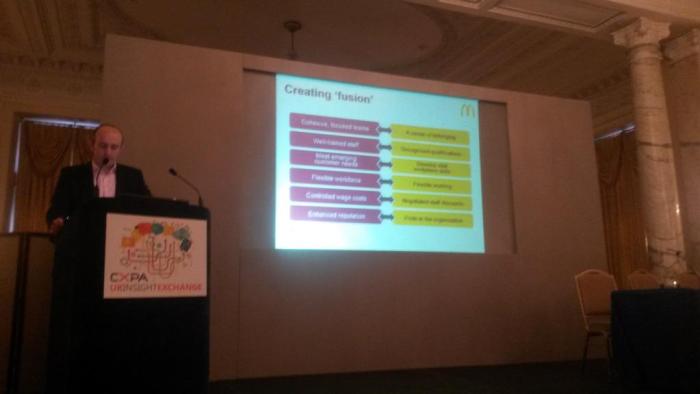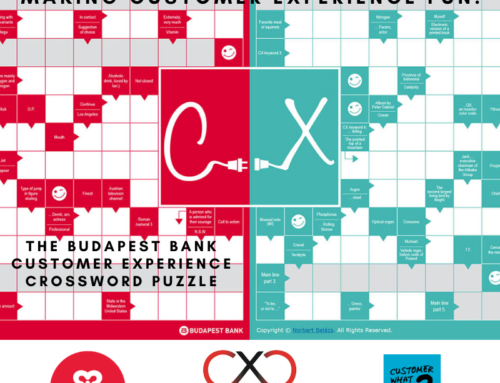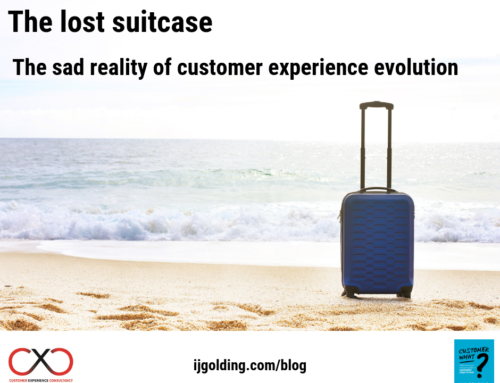Yesterday I had the enormous pleasure of co-chairing the first ever Customer Experience Professionals Association (CXPA) Members Insight Exchange to be held outside of the US. The gathering of Customer Experience Professionals (CXPs) from across Europe was as inspiring an occasion as I hoped it would be. I have always said that when you put a group of CXPs in a room it acts as a mass counselling session – the Member 2 Member principle that underpins the CXPAs approach enabled everyone present to learn from each other in a wonderful collaborative environment.
What struck me throughout the day was the clearly evident ability of almost everyone present to communicate and integrate together in friendly, engaging and warm conversation. It is not often you put practitioners and vendors in a room together, many of whom are technically competitors of each other, only for them all to act as extended members of family!! The CXPA is all about learning from each other (as I have already said), but it is one thing stating the ambition and a completely different thing seeing it actually work in practice.
It was therefore fascinating for me to reflect on the day by connecting some of the thoughts from the very first speaker with everything else that followed. We were honoured yesterday to be addressed by a business that has incredibly successfully re-invented itself in the UK over the last few years. Unlike it’s US parent, McDonald’s UK has managed to maintain a very firm place in the heart of millions of UK consumers. Jack Upton, UK Director for Training, Education & Customer Services shared his thoughts on what lies behind their success – ‘blending the employee and customer experience’.

Jack Upton addressing the CXPA UK Members Insight Exchange
Jack shared many valuable insights – from their use of the ‘people-profit chain’, to the increase in importance of ’emotional engagement’ between employees and customers, to the principle of ‘fusion’ – the better the delivery of customer experience at McDonald’s, the greater the value for the employee. Yet it is when Jack started to talk about ‘soft skills’ that my ears pricked up. Yes…..soft skills.
I, like many CXPs am often accused of talking only about the ‘soft and fluffy’. In fact I have used the image of the lovely cute dog at the head of this post in many presentations I have made to senior leaders over the last few years. Whilst I take the ‘soft and fluffy’ accusation in my stride, it is important to consider whether there is actually anything wrong with talking about the soft and fluffy!! Jack’s insight into the importance of soft skills to the McDonald’s business helps to explain why.
Before I expand on Jack’s thoughts, let me clarify what is meant by the term ‘soft skills’. I shall do this by quoting the modern ‘font of all knowledge’ – Wikipedia:
Soft skills is a term often associated with a person’s “EQ” (Emotional Intelligence Quotient), the cluster of personality traits, social graces, communication, language, personal habits, friendliness, and optimism that characterize relationships with other people.
McDonald’s is one of the biggest employers of young people in the UK. The development of soft skills in these young people is core to their approach. In fact the development of people is one of the cornerstones of the success of McDonald’s this side of the Atlantic. I have seen this in evidence with my very own eyes – McDonald’s training facilities are quite simply fantastic.
Research led by McDonald’s and backed by other organisations including the CBI, Barclays and learndirect, as well as entrepreneur James Caan has identified that Soft skills such as communication, teamwork and time management contribute £88 billion to the UK economy! You can read more about the research in an article published in HR Magazine in January 2015 – in it Neil Carberry, CBI director for employment and skills said:
“Business is clear that developing the right attitudes and attributes in people – such as resilience, respect, enthusiasm and creativity – is just as important as academic or technical skills.”
I could not agree more. In fact some of the best examples of genuinely Customer Centric organisations are those who solely recruit based on the ‘soft skills’ elements of Neil’s statement. Zappos, the online retailer now owned by Amazon, is perhaps the most famous example of all. Jack confirmed that this approach is just as important to McDonald’s. Soft skills alone do not guarantee the consistent delivery of great experiences, but if you are able to leverage the power of these skills, the behaviour of your people will go a huge way to developing unbreakable emotional bonds between employees and customers.
With this fresh in my mind, it was therefore no wonder that a room full of CXPs was able to engage with each other so successfully. CXPs do not just possess a collective obsession and passion for all things customer experience. They are also living, breathing examples of people with highly developed ’emotional intelligence’. CXPs understand the importance of a strong work ethic; having an unbreakable positive attitude; great communication skills; good time management; the ability to solve problems; working as a team; accepting and learning from criticism; flexibility; adaptability; working well under pressure; and doing the right thing. These are the attributes of brilliant CXPs – these attributes are known as ‘soft skills’
Maybe the soft and fluffy is not such a bad thing after all. I have met many leaders in my time who do not understand the importance of ‘soft and fluffy’. These leaders do not possess an abundance of emotional intelligence. One of these so-called leaders once called me ’emotionally immature’ – I will never forget it – although it is one of the many things I have learned from in my career.
I believe that the more you can leverage the soft skills within your organisation, the more your organisation will want to engage emotionally with your customers. Emotional engagement and empathy generate advocacy. Advocacy leads to loyalty. Loyalty leads to sustainable growth. Makes perfect sense to me……what about you?
If you have two minutes, please take the time to complete my 2 question survey to find out your personal #1 brand for delivering consistently good customer experiences. I also want to know what makes the brand your #1! The research will be used for an upcoming blog post – many thanks for your time!
You can complete the survey by clicking here







Soft skills may appear to be soft and fluffy, but they can take you places. They are absolutely vital to survive and thrive.
Many thanks for taking the time to read and comment – let’s hope more and more organisations agree going forward!